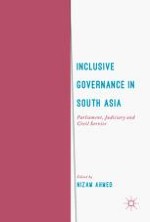2018 | OriginalPaper | Chapter
13. Democracy, Inclusive Governance and Social Accountability in South Asia
Author : Subhash C. Kashyap
Published in: Inclusive Governance in South Asia
Publisher: Springer International Publishing
Activate our intelligent search to find suitable subject content or patents.
Select sections of text to find matching patents with Artificial Intelligence. powered by
Select sections of text to find additional relevant content using AI-assisted search. powered by
